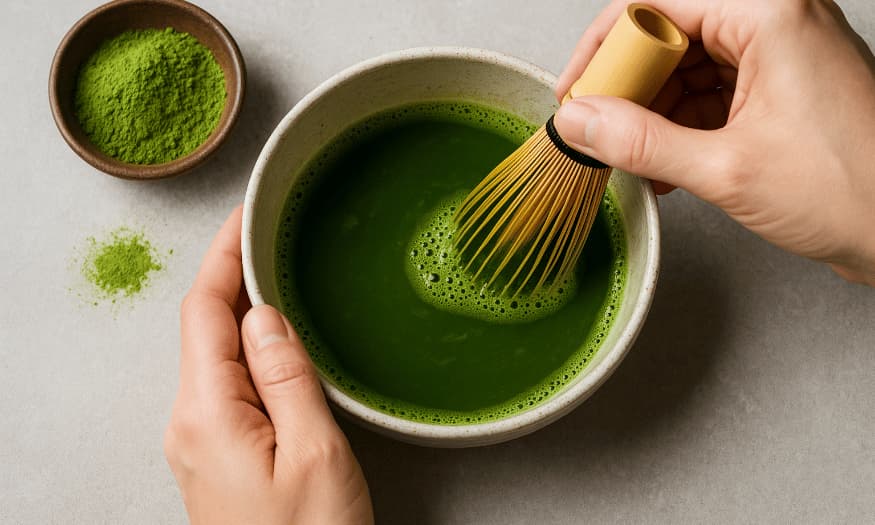Ready to give your day a natural boost? Matcha is loaded with nutrients and rich flavor that may support your health. Its bright green color and earthy taste make it a popular choice in lattes, smoothies, and desserts. Before you enjoy your next cup, discover what makes matcha special and how it fits into your healthy lifestyle.
What Is Matcha the Emerald Superfood

Matcha is a finely ground powder made from specially grown green tea leaves (Camellia sinensis), deeply rooted in Japanese tea culture. Unlike regular green tea, where the leaves are steeped and then discarded, matcha allows you to consume the entire leaf, delivering more concentrated nutrition in every sip.
Before harvest, the tea plants are carefully shaded from direct sunlight. This process increases the levels of natural compounds like L-theanine and chlorophyll, making matcha richer in antioxidants and nutrients than standard green tea. As a popular superfood powder, matcha supports daily wellness with concentrated nutrients. Similarly, spirulina is another nutrient-dense powder packed with antioxidants— discover more about its benefits in Spirulina: The Magic Superfood from Under the Sea.
How Matcha Supports Your Health Naturally
Matcha has many natural nutrients that help support your health and keep you feeling good.
1. Packed with Antioxidants
Matcha contains high levels of antioxidants called Epigallocatechin gallate (EGCG). These antioxidants help protect your cells from damage caused by free radicals, which are linked to aging and disease. Drinking matcha regularly helps your body fight oxidative stress and keeps your cells healthier.
2. Provides Calm and Focused Energy
Matcha contains natural caffeine, along with L-theanine. This combination gives you sustained energy and sharp focus without the jitters or crashes that coffee can cause.
3. Supports Metabolism and Weight Management
Matcha can help your body burn calories more efficiently. It gently boosts your metabolism and supports fat burning, which may assist with weight management over time when combined with a healthy lifestyle.
4. Good for Your Heart
Regular matcha consumption may lower your risk of heart disease by reducing bad cholesterol (LDL) and supporting healthy blood pressure levels.
5. Helps Your Body Detox Naturally
The chlorophyll in matcha helps cleanse your system by aiding the body’s natural detoxification processes. It supports liver health and helps flush out unwanted toxins.
6. Boosts Your Immune System
Matcha supports your immune system by providing vitamins, minerals, and antioxidants that help your body fight off germs and recover more quickly from illness.
7. Extra Wellness Benefits
Matcha can help improve focus and memory. It supports healthy gut bacteria, aids liver function, and helps maintain stable blood sugar levels. Additionally, its antioxidants have shown potential to slow the growth of cancer cells in lab studies.
Potential Side Effects of Matcha You Should Know
When you drink matcha, you can get many health benefits, but it’s also good to know about some possible side effects, especially if you have a sensitive body or drink too much. Each cup has around 60–70 mg of caffeine, which might make you feel shaky, cause headaches, or disturb your sleep.
If you’re curious about how your body responds to caffeine, you can read more in What is Your Body Trying to Tell You?
Consuming matcha on an empty stomach or in excessive amounts may lead to stomach discomfort, nausea, or even diarrhea. In rare cases, matcha can cause allergic reactions such as itching or rashes. Long-term overuse might strain your liver or reduce your body’s ability to absorb iron. Matcha may also affect how certain medications work, like blood thinners. Consult your doctor if you’re on medication or have health concerns.
How Much Matcha Should I Drink Per Day?
Most healthy adults can safely enjoy about 1 to 2 cups of matcha per day, which equals around 2 to 4 grams of powder. It’s best to start with a smaller amount to see how your body responds, especially for those new to matcha or sensitive to caffeine. To get the most health benefits, avoid adding too much sugar or sweeteners.
Pregnant or breastfeeding individuals, children, and those with medical conditions should consult a doctor before making matcha a regular part of their routine. If you experience side effects such as jitters or difficulty sleeping, reduce your intake or stop drinking matcha.
Creative Ways to Enjoy Matcha
Matcha isn’t just for lattes! You can mix this vibrant green powder into so many things:
- Add it to smoothies or protein shakes
- Stir into oatmeal or overnight oats
- Bake into muffins, cookies, or energy bites
- Sprinkle over chia puddings or yogurt.
It’s a healthy way to upgrade your meals, especially alongside these healthy snack ideas for weight loss.
Matcha: More Than a Trendy Drink, a Superfood for Your Lifestyle

Matcha is more than a trendy drink. it’s a powerful superfood that supports your metabolism, focus, digestion, and even heart health. It can be part of a balanced lifestyle when enjoyed in moderation.
And remember matcha isn’t just for tea lovers. You can drink it, eat it, or even use it in skincare for a natural glow. Just listen to your body and enjoy it your way!
Alphonsa George
Junior Nutritionist







